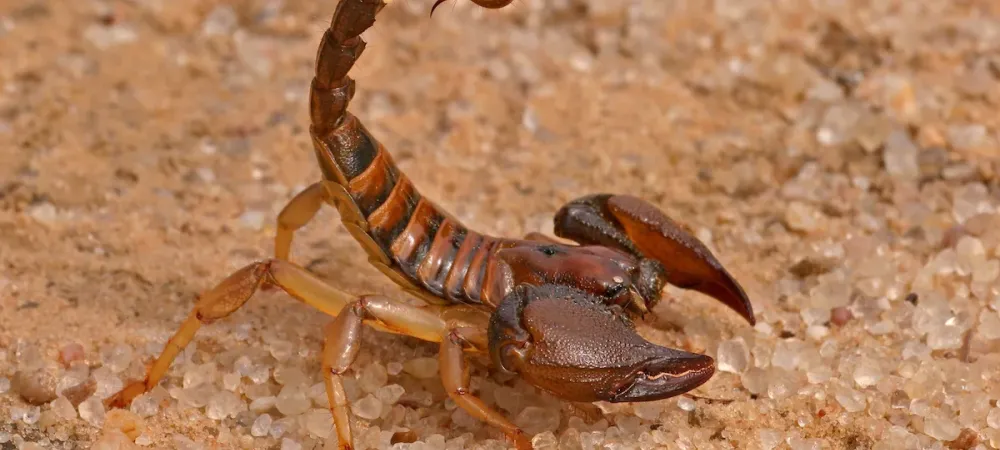Our Guide to Scorpions in Arizona

Types of Scorpions in Arizona
While there are more than 60 species of scorpions in the United States, only a handful of them can be found in Arizona. The most common types of scorpion in Arizona include the following:
Arizona Bark Scorpion
Giant Hairy Scorpion
The Giant Hairy Scorpion, also known as the Desert Hairy Scorpion, is the largest scorpion species found in Arizona and one of the largest in North America. These impressive arachnids can grow up to 7 inches in length, making them easy to spot in the arid deserts they inhabit. They are typically brown or yellowish-brown, with darker coloration on their backs and a distinct, coarse layer of hair on their legs and bodies. This hair is not just for show — it serves a sensory function, helping them detect vibrations in their environment, which is essential for locating prey and avoiding predators.
Unlike the smaller, more dangerous Bark Scorpion, the Giant Hairy Scorpion’s venom is relatively mild. Though not considered a serious threat to humans, its sting can still be quite painful, often causing localized pain, redness, and swelling that may last several hours. Generally, these scorpions are not aggressive and will only sting if provoked or threatened.
Arizona Stripe Tail Scorpion
The Striped Tail Scorpion is a small, dark-colored scorpion commonly found across Arizona and the southwestern United States. These scorpions typically measure between 2 to 3 inches in length, with females often being slightly larger than males. They are characterized by their black or dark brown bodies and the two distinct, thick stripes running down the length of their segmented tails, which give the species its name. These markings help distinguish them from other scorpions in the region.
While the Striped Tail Scorpion is armed with a venomous stinger, its venom is relatively mild compared to more dangerous species. Its sting, though potentially painful, poses minimal risk to humans and generally results in temporary symptoms like redness, mild swelling, and localized pain. However, as with most scorpions, they will only sting in self-defense when they feel threatened or are accidentally disturbed.
Yellow Ground Scorpion
The Yellow Ground Scorpion, commonly found in Arizona and other southwestern states, is a small to medium-sized scorpion that measures between 2 to 3 inches in length. Its coloring ranges from light tan to brownish-yellow, helping it blend seamlessly into the desert landscape of sandy soils and rocky terrain. This natural camouflage is essential for both evading predators and ambushing prey, as Yellow Ground Scorpions are opportunistic hunters who rely on stealth.
While not typically aggressive, Yellow Ground Scorpions are equipped with a venomous sting they use to subdue small prey, which primarily includes insects and other arthropods. Although their sting is not considered dangerous to humans, it can still cause a painful reaction with symptoms like swelling, redness, and a burning sensation that may last a few hours. For most adults, these symptoms are mild and subside without the need for medical attention. However, individuals with sensitive skin, children, or those allergic to insect stings might experience more discomfort and should monitor symptoms after a sting.
Where do Scorpions Live?
In Arizona, scorpions are commonly found in a variety of environments, particularly in the desert landscapes of the Sonoran Desert, which includes regions around Phoenix and Tucson. They thrive in sandy soils, rocky areas, and lowland desert scrub, where they can easily hide under rocks, within crevices, or beneath vegetation like cacti and creosote bushes.
In residential areas, scorpions can also find their way into homes, often entering through cracks in foundations, gaps around doors and windows, or through openings in utility lines. Inside houses, they may hide in dark, damp areas such as basements, garages, and bathrooms, or in cluttered spaces where they can find refuge.
Are Scorpions Dangerous?
Although scorpions are not aggressive by nature, they will attack if they feel threatened. They are most dangerous to small children and pets, who may be more susceptible to the effects of their venom. However, even healthy adults can experience serious health problems if they are stung by a scorpion.
Symptoms of a scorpion sting include pain, swelling, and numbness at the site of the sting. In some cases, people may also experience difficulty breathing or dizziness. If you or someone you know is experiencing these symptoms, it is important to seek medical attention immediately.
Are Baby Scorpions More Dangerous?
Baby scorpions, or scorplings, are not necessarily more dangerous than adult scorpions, but there are some important differences to note. Baby scorpions may sting more readily if they feel threatened because they are smaller and more vulnerable. Although a baby scorpion's sting can be painful, adult scorpions can deliver larger stings and inject more venom, which often results in more severe reactions
What to Do if You Get Stung by a Scorpion
If you are stung by a scorpion, it is important to seek medical attention immediately. The venom from these creatures can cause intense pain and swelling. If you have any allergic reactions, you should also be sure to call 911 or go to the nearest hospital emergency room. You can also call the Arizona Poison & Drug Information Center at 1-800-222-1222 for first aid instructions. This service is free, confidential, and open 24 hours a day, seven days a week.
Do not try to catch or kill the scorpion that stung you. This will only increase your risk of being stung again.
What do Scorpions Eat?
Scorpions are opportunistic predators and will eat just about anything they can catch — including insects, spiders, lizards, and rodents. In heavily infested areas, they may even resort to cannibalism. If food is scarce, scorpions can go for long periods without eating and survive on the fat reserves stored in their tails.
Signs of Scorpions In Your Home
If you think there may be scorpions in your home, look for the following signs:
- Droppings — Scorpions leave behind black droppings that look like pepper flakes.
- Exoskeletons — Scorpions molt (or shed their skin) several times during their lifetime. You may find these exoskeletons near where they're hiding.
- Scuttling noises — You may hear some scuttling or scratching noises, especially at night when the creatures are most active.
- Live scorpions — The most obvious sign is actually seeing one.
If you notice any of these signs, it's important to take steps to get rid of the scorpions as soon as possible. Otherwise, they may reproduce and create an even bigger problem.
What Attracts Scorpions To Your Home?
There are a few different factors that can make your home more appealing to scorpions, and understanding these can help you take the necessary steps to deter them.
- Food Sources — Scorpions are predators and they will eat just about anything they can catch, including other scorpions. So, if your home has a lot of insects, spiders, or other pests, this can be a big attractant for scorpions.
- Shelter — Another reason they are drawn to your home is that it provides shelter from the elements. Scorpions are cold-blooded creatures and they like to find places where the temperature is more moderate. And what’s more, homes are usually filled with hiding places for scorpions to nest.
How to Prevent Scorpions
So, if you want to keep scorpions away from your home, there are a few things you can do.
- Make sure to seal up any cracks or crevices in your home’s foundation and walls. This will help to prevent scorpions from getting inside in the first place.
- Keep your yard clean and free of debris. Scorpions like to hide in clutter, so keeping your yard tidy will make it less appealing to them.
- Try to reduce the number of insects in and around your home. If there are fewer insects for scorpions to eat, they’ll be less likely to stick around. Getting recurring pest inspections and treatments can go a long way toward keeping your home pest-free.
By following these simple tips, you can help to keep scorpions away from your home and keep your family safe.
Call Greenleaf’s Professional Scorpion Exterminators
For the most guaranteed protection, call a professional scorpion removal company. If you're in the Phoenix area, Greenleaf Pest Control provides professional scorpion control that will assess your situation, identify potential entry points, and implement a comprehensive treatment plan. Get started with a free quote today!





